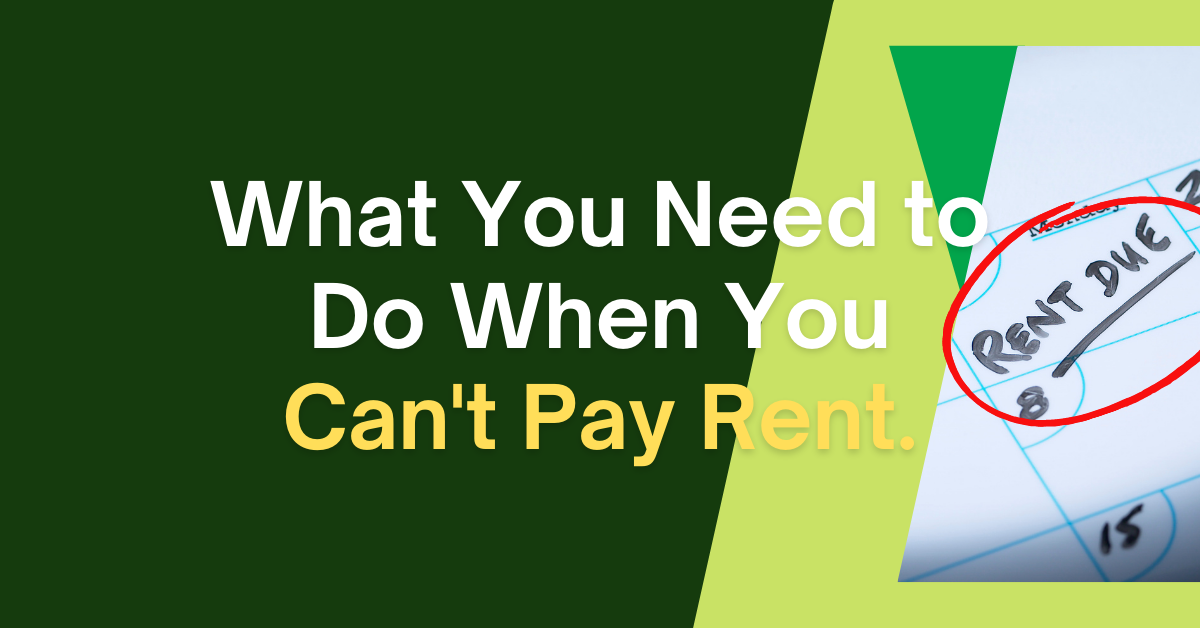About the Author
Aileth Kim
Aileth is on the Operations Team with RentReporters. She has been a part of the community since 2018.

September 10, 2021
12 mins read

Every so often, life throws the unexpected at us and we find ourselves in a difficult financial situation. We experienced exactly this during COVID-19; the pandemic caught us all by surprise and caused ramifications that we’re still working to undo. Some lost their jobs, others their businesses and some of us were even unable to pay our rent. If you’re unable to pay rent, you may face eviction. So what happens if you find yourself unable to afford your upcoming rent? We’ll go over some resources and tips that you can try to help you in this scenario that many are all too familiar with.
We’re not going to sugarcoat this; you’ll likely be facing an uphill battle and results will vary depending on whom you rent from (i.e. Independent Landlord vs Property Management Company).
But don’t panic!
You have far more options and resources available to you than you may realize and getting to work and knowing where to look instead of panicking may make the difference between eviction and keeping your lease.
Independent landlords are regular people like you and me who saved up enough money to afford a down payment on a second property. They’ll likely have a mortgage on not just their primary residence but on their rental property as well. Landlords typically make about a $300 to $500 profit per month which, while nice to have, isn’t all that much. As such, independent landlords can’t afford to pay their mortgage without the rent payments being made timely and can face the possibility of losing their property.
You can always try asking your independent landlord to waive your rent payment altogether. Although most landlords probably won’t be able to afford to do that, it definitely doesn’t hurt to ask! You’d be surprised by how much one email or letter to your landlord can help you out.
Properties need to be maintained and landlords don’t always have the time or the manpower to do that themselves. If you have expertise in maintenance work whether it be gardening or plumbing, offer to take care of the work on the property so that your landlord doesn’t need to pay for the additional work, in exchange for a reduction in rent. Perhaps there are renovations your landlord wants to do that you have the ability to perform. Renovations increase property value and are seen by landlords as an investment so they may be willing to let you perform the work in lieu of paying rent. Not to mention you’ll have a nicer, upgraded place to live in after.
Your landlord is just as human as you are. Chances are they will be understanding of your situation and do their best to come up with an agreement that will benefit both parties.
Management companies are going to primarily be concerned with their profit margins and the fact is, it’s expensive to have to go through an eviction process. Management companies may also own their properties outright and be more in tune with government programs available to them, so they may be less impacted than independent landlords if you are unable to pay for a month or two. Make sure your property management company understands that your financial situation will improve and you will be able to remit the full rent payments again. From a property management standpoint, it’s probably cheaper for them to take a reduced rent or even no rent for a couple of months from a reliable tenant like yourself that they’ve been able to trust than it would be to spend the money acquiring a new tenant that they don’t have any relationship with.
If you’ve been paying your rent on time up until now, more times than not, it’s in your property management’s best financial interests if you continue renting from them rather than them having to find a new tenant, so try to appeal to them in that way. Ask for a waiver of rent for a month or two, pay what you can, and offer to help with maintenance and work as well so they can maintain as much profit as possible. It might be hard to think about their money when you’re worried about your own, but you have to know your audience and speak the same language as them if you want to have a successful negotiation. Once you understand who you’re dealing with, and what their needs and motivations are, talk to them and see what they’re willing to do.
If you’re unable to negotiate with your landlord or property management, start educating yourself on tenant rights. We won’t be able to tell you all of these because they vary from state to state and city to city, but we can direct you where to look. The best place to start is the Housing and Urban Development (HUD) website. This site breaks down renters’ rights by state, provides handbooks on frequently asked questions for tenants and landlords, and even provides links to legal resources.
You’ll also want to know the specifics of your individual city as well. For example, by Googling Los Angeles Renters’ Rights, you’ll find a 124-page pdf on the LA Public Health website that spells out the specific laws for LA county, including the situations when a landlord is allowed to terminate a tenancy. If your landlord is not following the laws laid out in the handbook, you may be able to keep your residence, as long as you know your rights.
So take the time to learn your renter’s rights, especially because additional rights were granted since COVID-19. You can use resources like NoRent.org to help you draft that letter we were talking about to communicate with your landlord and to help you with your case.

In just a few minutes, discover your credit knowledge level and get instant access to a FREE credit education course tailored to you!
There are dozens of federal and state government programs, as well as hundreds of non-profit organizations to help provide assistance and prevent homelessness.
A great place to start is helpingamericansfindhelp.org which has a whole section of their website dedicated to the different federal programs available along with state-by-state breakdowns of programs not only for homelessness prevention but also for income assistance. For example, in Georgia, there is a Low Income Home Energy Assistance Program to help people pay for some of their utility bills and the Temporary Assistance for Needy Families program which provides cash to low-income families with children under eighteen.
Take the time to do a Google search on housing assistance programs in your area that you may qualify for. It might just take a single phone call or a click of a button to get cash in hand so you can get your rent paid and buy yourself some time to improve your situation.
As a final fallback, in desperate times, there’s no shame in asking others for help via crowdfunding platforms like Indiegogo or Gofundme. We know that this is probably unconventional to most but it’s better than losing your home. The people on these platforms not only have the means to help, they want to help so don’t be afraid to use it as a final option!
The one thing you should NEVER do when you can’t pay your rent is to bury yourself deeper in debt by taking out a personal loan, title loan, or credit card loan.
Personal loans and other forms of debt can actually be a great temporary solution for certain situations, but paying rent isn’t one of them. Although personal loans seem tempting, the clock starts ticking on the loan repayment immediately. So now, not only do you have rent to pay, you now have several hundred more dollars to pay every month on top of your rent.
Keep in mind, personal loans are typically on a three to five-year repayment plan and will cost you thousands of dollars in interest. Even after getting your financial situation back on track, you might not be able to afford the loan and your other obligations. Most personal loans also come with personal guarantees stating that you forfeit your property in the event that you can’t pay the loan back, and you can have your assets like your car, furniture, and more taken away from you until the debt is paid. We know personal loans seem like a convenient solution but it will only cause more headaches!
You probably would never expect to find yourself in a position where you can’t pay your rent, but it’s always better to be prepared. We have great resources available to us that can keep up afloat. Plus, you never know; your landlord may just be able to help you out when things get tough.
Aileth is on the Operations Team with RentReporters. She has been a part of the community since 2018.
